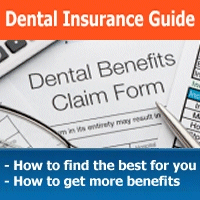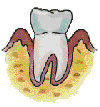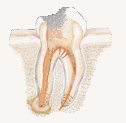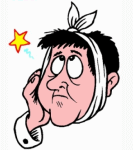
Bruxism Pain Relief
• Teeth Grinding & Clenching Pain
Last Updated: 12/03/2017
Bruxism pain refers to the tooth or mouth pain due to teeth grinding and teeth clenching, as a result of any type of forceful contact between the teeth.
Teeth grinding and teeth clenching are conditions that affect teeth and mouth tissues causing several types of pain. In most cases stopping bruxism is enough to stop the related pain, but additional treatment may be required for permanent pain relief if the condition has already damaged the teeth (e.g. tooth wearing, cracks).
What is Bruxism?
Teeth grinding and teeth clenching are conditions that affect a large percentage of the population, both children and adults. People with bruxism are unconsciously clenching or grinding their teeth together while awake or asleep, more often when they feel anxious or tense. Allthough the exact causes are unknown, most experts believe that bruxism is mainly related to increased psychological stress and anxiety. Read more about the causes of bruxism.
Many people are not aware that they have a bruxism problem because they grind/clench their teeth at night while asleep, without realizing it until they start feeling pain or their dentists notice signs of tooth or jaw damage caused by the disorder. Tooth grinding or clenching that occurs at night is called sleep bruxism. Sleep bruxism is often the bigger problem because it is harder to control. It is one of the most common sleep disorders, especially in children.
Teeth grinding is a condition when the teeth of the bottom and upper jaw are moved against each other with a side to side action. This can wear down the occlusal (biting) surfaces of the teeth. In most cases, teeth grinding involves the front teeth, canines and incisors. It can lead to tooth wear, jaw pain and other dental problems.
Teeth clenching is a condition when you tightly hold your top and bottom teeth together, especially the back teeth. Most people clench their teeth when they perform tasks that require intensive force. The real problem is when it becomes a habit. Some people clench their teeth even for mental tasks; others while just watching tv.
Why Teeth Grinding and Teeth Clenching may Cause Pain?
Long term teeth grinding and teeth clenching has damaging effects on both teeth and mouth tissues. Most of these effects result in tooth and/or mouth pain.
- Worn down teeth – abraded teeth. Patients with bruxism may grind their teeth so hard that sometimes significant amounts of tooth structure can be lost over time.
 Teeth move against each other in a side to side action. This abrades tooth enamel, removing the sharp biting surfaces and flattening the edges of the teeth.
The front teeth may become worn to exactly the same length and look flat at the tips. This damage to teeh enamel soon results in pain due to:
Teeth move against each other in a side to side action. This abrades tooth enamel, removing the sharp biting surfaces and flattening the edges of the teeth.
The front teeth may become worn to exactly the same length and look flat at the tips. This damage to teeh enamel soon results in pain due to:
- Tooth sensitivity pain – Teeth become sensitive to cold, pressure and other stimuli. Worn tooth enamel exposes the softer part of the tooth (dentine) making the affected teeth susceptible to tooth sensitivity pain problems.
- Tooth decay pain – Damage to the tooth enamel makes it easier for bacteria to penetrate to the softer part of the teeth, increasing the possibility of tooth decay.
- Fractures of teeth or fillings is a common symptom in bruxism patients. Teeth clenching puts teeth under high pressure. Teeth grinding wears down the enamel, weakening the tooth structure. As a result of bruxism, teeth may start to show micro-fractures or cracks and sometimes break (especially if they have restorations). If you experience a sharp pain on a tooth only when biting it is more likely a cracked tooth pain.
- Pressure on teeth – The constant pressure of teeth clenching puts under stress the periodontal tissues around every tooth. If you feel a dull pain that seems to originate from more than one teeth (sometimes of both jaws) it is possibly a pressure pain due to bruxism.
- Cheek or tongue bites - It is common for people with bruxism problem to bite their tongue or inner cheek, especially close to the molars area.
- TMJ or jaw pain - Chronic bruxism is one of the leading causes of TMJ pain. Some of the painful symptoms of temporomandibular joint disorders, that could be caused by bruxism, are sore jaw muscles, facial pain around the jaw or ears area when chewing, and frequent headaches or pain in the neck or shoulders.
Teeth Grinding and Teeth Clenching Pain Relief
- Stop Bruxism. Stopping bruxism will eliminate most of the pain related with teeth grinding and clenching, such as the pressure pain.
Jaw pain will also stop although it may take some time for jaw joint muscles to relax. Learn more about how to stop bruxism.
Unfortunately, stopping the habit of bruxism is not enough for restoring any permanent damage already caused to the teeth such as enamel loss or cracks. Further treatment may be required to relieve the pain.
- Dental night guards.
 The most common treatment suggested by dentists to relieve bruxism pain is a custom-made specially-fitted dental mouthguard
that is worn during sleep to prevent and minimize the effects of unconscious teeth grinding and clenching.
Dental night guards may significantly reduce the incidents of pressure pain and the risk of sensitivity pain protecting tooth enamel from further abrasion.
The most common treatment suggested by dentists to relieve bruxism pain is a custom-made specially-fitted dental mouthguard
that is worn during sleep to prevent and minimize the effects of unconscious teeth grinding and clenching.
Dental night guards may significantly reduce the incidents of pressure pain and the risk of sensitivity pain protecting tooth enamel from further abrasion.
A dental night guard is a thin horseshoe-shaped appliance made of hard plastic. The night guard fits between your upper and lower teeth, to prevent further dental damage to teeth by absorbing the force of clenching or grinding.
- Sensitive teeth toothpaste. If a tooth has moderate abrasion due to teeth grinding causing episodes of tooth sensitivity pain, using a special toothpaste for sensitive teeth may provide adequate pain relief.
- Dental Crowns. If a tooth has extensive enamel loss that has exposed the dentine leading to severe tooth sensitivity pain, or if the tooth structure has weakened or already cracked, the best solution to restore the tooth and stop the pain is the placement of a dental crown. A dental crown is an indirect restoration that covers the entire visible part of the tooth with a tooth-shaped “cap” in order to replace lost tooth structure, to protect and strengthen the tooth. Before the placement of a crown the patient must have stopped bruxism, otherwise there is a high risk for crown breakage due to pressure.
- Medications. In general, medications aren't very effective for treatment of bruxism. Taking a muscle relaxant before bedtime may help in some cases. If bruxism is developed as a side effect of an antidepressant medication, your doctor may change your medication or prescribe another medication to counteract bruxism.
- Apply heat. Applying a warm, wet washcloth to the side of your face can help relax muscles sore from clenching and reduce tension pain.
- Stress management. Everyday stress is a major contributor to teeth grinding and clenching. Keeping the life stress to a minimum may reduce the risk of pain related to bruxism problems.

 Dental Insurance
Dental Insurance Sensitive Teeth Pain
Sensitive Teeth Pain Cracked Tooth Pain
Cracked Tooth Pain Tooth Abscess Pain
Tooth Abscess Pain Toothache Remedies
Toothache Remedies Toothache Medicines
Toothache Medicines